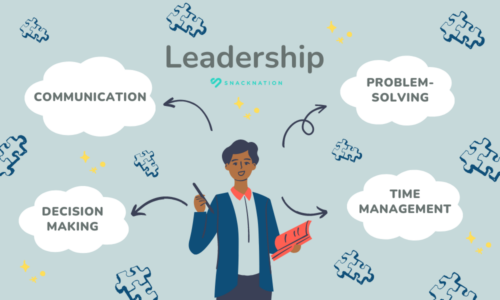
Improving your leadership skills is a crucial aspect of professional development. Whether you’re an aspiring manager or an experienced executive, figuring out what type of leader you are and enhancing your leadership skills can help you become a more effective and successful leader.
Pro-Tip from The Assist: “Lead by example, not by expiration date.” In other words, don’t let your leadership style become stale and outdated, but rather set a good example and stay current with the times.
Leadership skills are not just about managing people, but also about inspiring and motivating them to achieve their goals. By improving your skill set, you can create a positive work environment, build strong relationships with your team, and boost productivity and morale.
Whether you’re a seasoned manager or just starting out in a leadership role, there’s always room for improvement when it comes to honing your skills and becoming a better leader.
Hey! Learn tips and tricks to becoming the best leader and overall professional with these FREE email newsletters:
| The Assist | 💼 Become a better professional in under 5 minutes | Subscribe Here |
| FounderIV | ⚡Achieve breakout founder performance with this free weekly email | Subscribe Here |
| Human Crapital | 🤭 Helping you avoid embarrassing, uncomfortable, and common HR mistakes | Subscribe Here |
Understanding Leadership Styles At Work
Defining Leadership
Before we dive into the different leadership styles, it’s important to define what leadership is. Leadership is the ability to inspire, motivate, and guide a group of people toward a common goal. A true leader is someone who has the vision, technical skills, and knowledge to lead a team toward success.
Different Leadership Styles
There are several leadership styles that you can adopt, depending on your personality, the situation, and the needs of your team.
Here are some of the most common leadership styles:
- Autocratic: This leadership style is characterized by a leader who makes all the decisions and gives orders to their team without seeking input or feedback.
- Democratic: This leadership style involves the leader seeking input and feedback from their team before making decisions. The leader still has the final say, but they take into account the opinions of their team.
- Laissez-faire: This leadership style involves the leader giving their team a lot of freedom and autonomy to make decisions and complete tasks. The leader provides guidance and support but ultimately leaves it up to the team to get the job done.
- Transformational: This leadership style focuses on inspiring and motivating the team to achieve their best. The leader sets high expectations and provides support and resources to help the team reach their goals.
- Servant: This leadership style involves the leader putting the needs of their team first. The leader serves their team by providing support, resources, and guidance to help them succeed.
Understanding your personal leadership style is important because it helps you identify areas in which you can improve or expand. It’s important to note that there is no one-size-fits-all approach to leadership. You may need to adopt different styles depending on the situation and the needs of your team.
Assessing Your Leadership Qualities & Skills
Assessing your leadership qualities and soft skills is an essential step in improving your leadership at work. By identifying your strengths and weaknesses, you can focus on areas that need improvement and build on your strengths.
Identifying Strengths and Weaknesses
One way to identify your strengths and weaknesses is to reflect on your experiences and achievements. Consider what you do well and what areas you struggle with.
You can use self-assessment tools, such as the Emotional and Social Competency Inventory (ESCI) and the Personal Values Questionnaire (PVQ), which can help you recognize behavioral patterns and gain insight into how you manage yourself and your colleagues.
Another way to identify your strengths and weaknesses is to ask for feedback from your team and colleagues. This can be done through one-on-one conversations, surveys, or anonymous feedback forms. Be open to constructive feedback and use it as an opportunity to improve career development.
Getting Feedback From Your Team & Colleagues
Getting feedback from your team and colleagues is an important part of assessing your leadership skills. It can help you understand how others perceive you and your leadership abilities. When asking for feedback, be specific about what you want to know and how you want to receive it.
For example, you could ask:
- What do you think are my strengths as a leader?
- What areas do you think I need to improve on?
- How can I better support you and the team?
Make sure to listen actively and take notes. Avoid becoming defensive or dismissive of feedback that you may not agree with. Instead, thank your team and colleagues for their feedback and use it to make positive changes in your leadership development.
Developing Key Leadership Skills For Work
Communication

Effective communication is a critical leadership skill that can help you build strong relationships with your team and create a positive work environment.
To improve your communication skills, start by actively listening to your team members and responding thoughtfully to their ideas and concerns. Pay attention to your eye contact and body language while your team members are speaking and listening to you. Make sure you are clear and concise when communicating your own ideas and expectations.
Furthermore, It’s a good idea to tailor your communication style to the needs of your team. Some team members may prefer face-to-face conversations, while others may prefer email or instant messaging. By altering your communication style to the needs of your team, you can ensure that everyone is on the same page and working towards the same goals.
Decision Making

As a leader, you will be responsible for making important decisions that can impact your team and your organization on a day-to-day basis.
To improve your decision-making skills, start by gathering all the necessary information and considering all the available options. It would also be a good idea to involve your team in the decision-making process whenever possible. By soliciting feedback and ideas from your associates, you can make more informed decisions that are more likely to be accepted and supported by your team.
Problem-Solving

Leadership often involves solving complex problems and making difficult decisions.
To improve your problem-solving skills, start by breaking down complex problems into smaller, more manageable pieces.
Encourage your team to brainstorm and come up with creative solutions to problems. By involving your team in the problem-solving process, you can tap into their diverse perspectives and come up with more effective solutions.
Time Management

As a leader, it’s essential to manage your time effectively so that you can focus on high-priority tasks and achieve your goals.
To better your time management skills, start by setting clear goals and priorities for yourself and your team. Start by implementing tools like calendars and to-do lists to stay organized and on track. Delegate tasks to your team members whenever possible to free up your own time for more important tasks. Remember to take breaks and prioritize self-care to avoid burnout and maintain your productivity.
5 Ways To Develop Leadership Skills For Work
Developing leadership skills takes time, effort, and dedication.
Here are 5 simple ways to develop your leadership skills at work:
1. Subscribe to The Assist
The Assist is a free 4x weekly email newsletter that delivers leadership tips and strategies in under 5 minutes each week. The newsletter covers a variety of topics, including communication, self-awareness, and team management. By signing up for The Assist, you can receive practical advice that you can apply to your work environment immediately.
2. Seek feedback
One of the most effective ways to develop your leadership skills is by seeking feedback from others. Ask your colleagues and team members for constructive criticism of your leadership style. The feedback you receive can help you identify areas where you need to improve and build on your strengths.
3. Take on new challenges
Taking on new challenges at work can help you develop your leadership skills. Volunteer for projects that require you to step outside of your comfort zone and take on new responsibilities. This can help you build your confidence and develop new skills that are essential for effective leadership.
4. Practice active listening
Active listening is a key component of effective leadership. When you listen actively, you show your team members that you value their input and opinions. To practice active listening, focus on the speaker, ask clarifying questions, and summarize what you have heard to ensure that you understand their perspective.
5. Lead by example
As a leader, your actions speak louder than your words. Lead by example by demonstrating the behaviors and values that you want your team to emulate. By doing this, you build trust and respect with your team, which is essential for effective leadership.
Why Is It Important To Become A Better Leader At Work?
Being a good leader is essential for success in any workplace. As a leader, you are responsible for guiding your team toward achieving their goals and objectives. Your ability to lead effectively can have a significant impact on your team’s productivity, motivation, and overall job satisfaction.
When you become a better leader, you can create a positive work environment that fosters teamwork, collaboration, and innovation. You can inspire your team to work towards a common goal and help them to realize their full potential. This can result in increased job satisfaction, which can lead to higher employee retention rates and reduced turnover costs for your organization.
Additionally, effective leadership can improve the quality of work produced by your team. When you lead by example and set high standards, your team members will be more likely to follow suit. This can lead to increased efficiency, improved communication, and better problem-solving skills among your team members. As a result, your team can produce higher quality work in less time, which can benefit your organization in numerous ways.
It is admirable to be constantly striving to be a better leader. By improving your leadership skills, you can create a positive work environment, inspire your team, and improve the quality of work produced by your team.
The Benefits of Developing Good Leadership Skills
Developing better leadership skills can have a significant impact on your career and your workplace. Here are some benefits of improving your leadership skills:
- Better Communication: As a leader, you must effectively communicate with your team members. By improving your communication skills and listening skills, you can ensure that your message is understood clearly, and you can avoid misunderstandings and conflicts.
- Increased Productivity: Great leaders can motivate their team members to work hard and achieve their goals. By developing better leadership skills, you can inspire your team members to be more productive and efficient, which can lead to better results for your organization.
- Improved Decision-Making: Leaders need to make tough decisions every day. By improving your decision-making skills, you can make better choices that are in the best interest of your team and your organization.
- Enhanced Creativity: Leaders need to be creative and innovative to solve problems and come up with new ideas. You can stimulate your team members’ creativity and encourage them to think outside the box.
- Greater Job Satisfaction: Good leaders can create a positive work environment that fosters teamwork, collaboration, and mutual respect. By developing better leadership skills, you can cultivate a workplace culture that promotes job satisfaction and employee engagement.
Evolving better leadership skills can help you become a more effective leader, improve your team’s performance, and enhance your career prospects. By investing time and effort in improving your leadership skills through leadership training, you can reap the benefits of being a respected and successful leader and role model in your workplace.
People Also Ask These Questions About Improving Leadership Skills
Q: How do I identify my leadership style, and why is it important to do so?
- A: Identifying your leadership style is essential as it helps you understand your strengths and weaknesses as a leader, and enables you to adapt your approach to different situations and team members, ultimately leading to greater success in achieving your team’s goals.Start by reading through this article (link to this article) and think about which style you resonate with the most. From there you can work on how to become a more empowering leader to your direct reports.
Q: What are some common mistakes that new leaders make, and how can I avoid them?
- A: New leaders often make the mistake of micromanaging, failing to communicate effectively, and not seeking feedback from their team. To avoid these mistakes, it’s crucial to trust and empower your team, actively listen to their perspectives, and regularly solicit feedback to improve your leadership abilities.
Q: Can I motivate team members who are resistant to change or seem disengaged?
- A: To motivate team members who are resistant to change or disengaged, it’s essential to understand their concerns and motivations and communicate how the change will benefit them and the team in the long run. Encouraging their involvement in the change process and recognizing their contributions can also help increase their motivation and engagement.
Q: In what ways can I manage the duality of being a leader and a friend, and how can I determine when it is suitable to transition between these two roles?
- A: As a leader, it’s crucial to balance personal life and professional, as blurring the lines can lead to potential conflicts of interest. It’s appropriate to switch between roles depending on the situation, but maintaining a level of professional distance and setting clear expectations can help strike a healthy balance.
Q: What are some ways to keep improving my leadership abilities and stay abreast of the latest advancements in the field?
- A: To continue developing your leadership skills and stay up-to-date with best practices, you can attend leadership training programs, network with other leaders, read leadership books and articles, and seek feedback from your colleagues. Additionally, regularly reflecting on your leadership style, and current leadership position, and seeking opportunities to practice and refine your skills can help you stay ahead of the curve.






